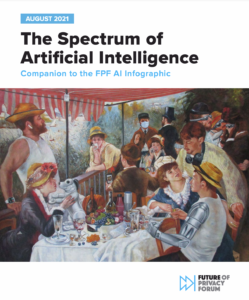Promoting Innovation, and Protecting Privacy in the Classroom
Today, FPF announces the release of two new student privacy related papers. They are:
Who Is Reading Whom Now: Privacy in Education from Books to MOOCs (Jules Polonetsky and Omer Tene (October 7, 2014), Vanderbilt Journal of Entertainment & Technology Law, Forthcoming. Available at SSRN: http://ssrn.com/abstract=2507044) and,
Student Data: Trust, Transparency and the Role of Consent (October 2014, Jules Polonetsky and Joseph Jerome, available at http://fpf.org/wp-content/uploads/FPF_Education_Consent_StudentData_Oct2014.pdf).
The first paper, Who Is Reading Whom Now: Privacy in Education from Books to MOOCs, discusses how education technologies, while presenting tremendous opportunities to make education more personalized, accountable, collaborative and engaging through social media, gamification and interactive content, also engender privacy concerns arising from the combination of enhanced data collection with highly sensitive information about children and teens.
The paper seeks to separate the core ed tech privacy issues from the broader policy debates surrounding education standardization, the Common Core, longitudinal data systems and the role of business in education. It argues that decision makers should unpack the distinct policy issues surrounding ed tech to facilitate levelheaded discussion and appropriate policy responses. It further separates privacy problems related to “small data,” the personalization enabled by optimization solutions that “read students” even as they read their books, from concerns about “big data” analysis and measurement, including algorithmic biases, discreet discrimination, narrowcasting and chilling effects.
The paper proposes a broad range of solutions, from deployment of traditional privacy tools, such as contractual and organizational governance mechanisms, to greater data literacy by teachers and increased parental involvement. It warns against kneejerk reactions to ed tech data processes, which may unwittingly accentuate a growing equity gap between the “haves” and “have nots.” It advocates enhanced transparency to increase parental engagement in and understanding of the role of technology in their children’s education. The paper builds on the authors’ previous work to balance big data rewards against privacy risks, while complying with applicable regulation.
The second paper, Student Data: Trust, Transparency and the Role of Consent, discusses how over the past decade, new technologies in schools have generated an “explosion of data” for public school systems to use and analyze. Accordingly, the Department of Education has identified the use of student data systems to improve education as a top national priority even as an increased focus on data has raised legitimate privacy concerns.
With parents worried that student data is being used for marketing purposes without appropriate contractual and legal safeguards, a “notice and choice” regime has had intuitive appeal. However, the paper shows that providing parents more notice and choice may do little to further student privacy while at the same time unintentionally excluding children from necessary education services.
The paper discusses the practical implications of consent requirements; explores how existing federal laws protect student data; and compares the activities of data vendors and the role of individual consent in the health and financial sectors. It argues that parents should not be resigned to opt-out of embracing new technologies as a result of legitimate privacy concerns. The paper concludes that policymakers must devise better ways to inform parents about how their children’s data is being used, and to provide students and parents with better tools to inform learning.
Other FPF efforts on student privacy include a resource web site at studentprivacycompass.org, and the launch of a Student Privacy Pledge with SIIA and leading tech companies. See www.studentprivacypledge.org to sign on to the pledge or for more details.
To learn more about FPF’s ongoing student privacy work, contact Brenda Leong, FPF Education Privacy Counsel at [email protected].



